Sociological & Psychological Theories in Health & Social Care Report
VerifiedAdded on 2023/06/11
|11
|3242
|71
Report
AI Summary
This report provides an analysis of key sociological and psychological theories and their application in health and social care. It explores various theories such as cognitive development theory, Piaget's constructive theory, and Vygotsky's social constructivist theory, detailing how these theories influence understanding of human behavior and development within healthcare settings. The report also addresses cultural and ethical issues prevalent in health and social care, including challenges related to equity of access, confidentiality of patient data, and cultural awareness. Furthermore, it discusses the application of ethical perspectives like non-maleficence, beneficence, respect for autonomy, and justice in ensuring ethical practices in diverse healthcare scenarios. The document concludes with an examination of needs assessment and the development of a service improvement plan, highlighting the importance of aligning health services with the needs of local populations and improving the quality of healthcare services.
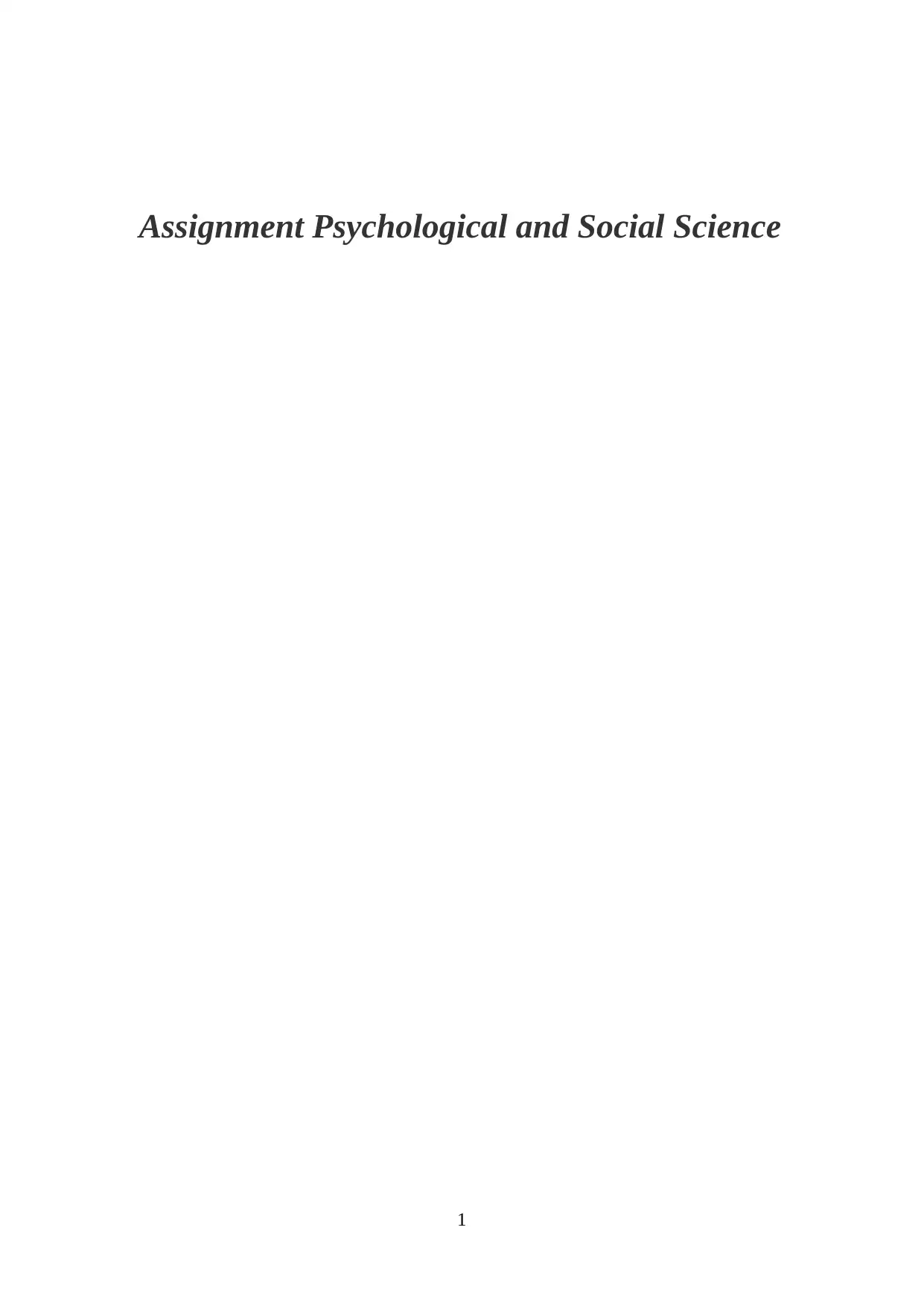
Assignment Psychological and Social Science
1
1
Paraphrase This Document
Need a fresh take? Get an instant paraphrase of this document with our AI Paraphraser
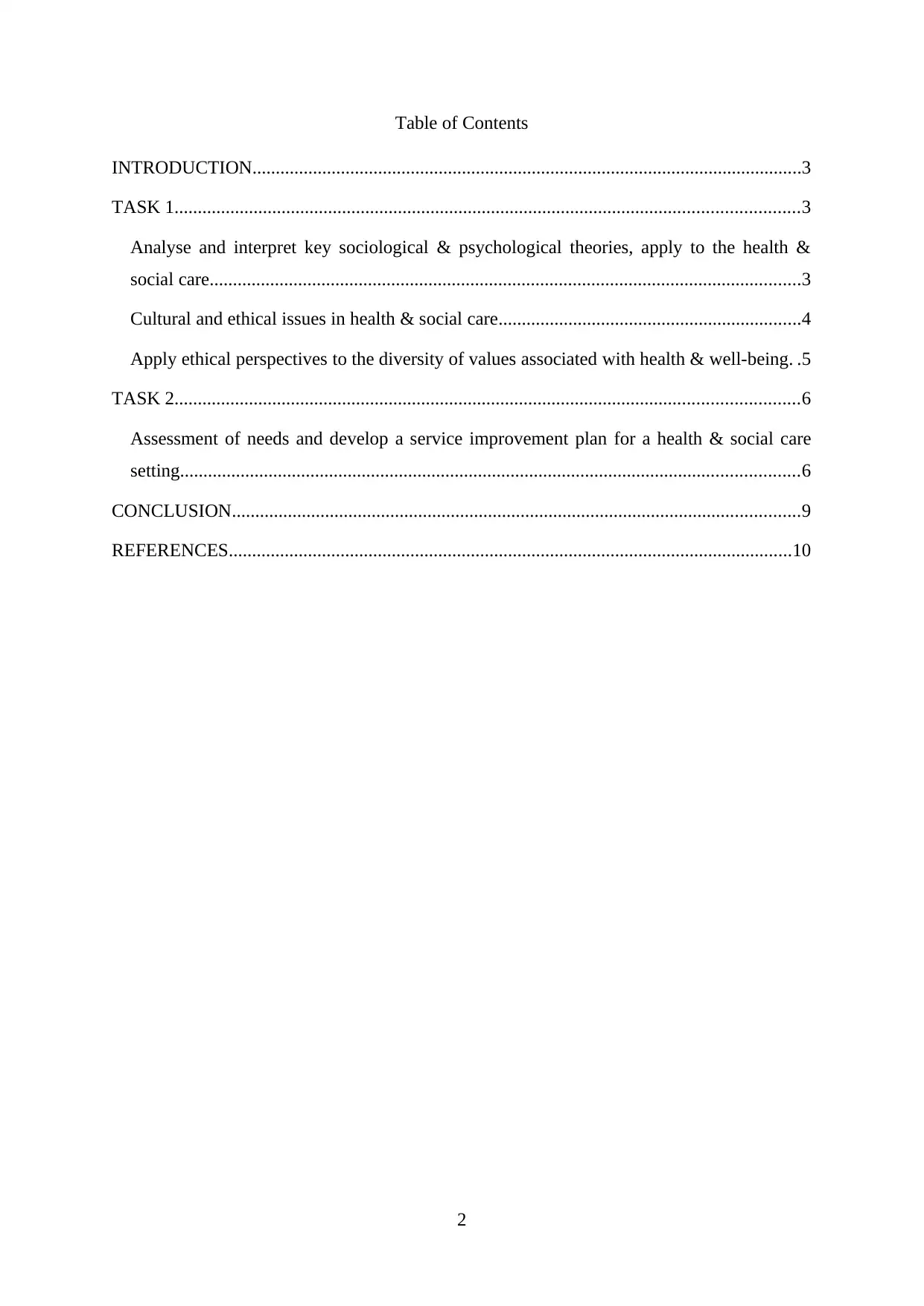
Table of Contents
INTRODUCTION......................................................................................................................3
TASK 1......................................................................................................................................3
Analyse and interpret key sociological & psychological theories, apply to the health &
social care...............................................................................................................................3
Cultural and ethical issues in health & social care.................................................................4
Apply ethical perspectives to the diversity of values associated with health & well-being. .5
TASK 2......................................................................................................................................6
Assessment of needs and develop a service improvement plan for a health & social care
setting.....................................................................................................................................6
CONCLUSION..........................................................................................................................9
REFERENCES.........................................................................................................................10
2
INTRODUCTION......................................................................................................................3
TASK 1......................................................................................................................................3
Analyse and interpret key sociological & psychological theories, apply to the health &
social care...............................................................................................................................3
Cultural and ethical issues in health & social care.................................................................4
Apply ethical perspectives to the diversity of values associated with health & well-being. .5
TASK 2......................................................................................................................................6
Assessment of needs and develop a service improvement plan for a health & social care
setting.....................................................................................................................................6
CONCLUSION..........................................................................................................................9
REFERENCES.........................................................................................................................10
2
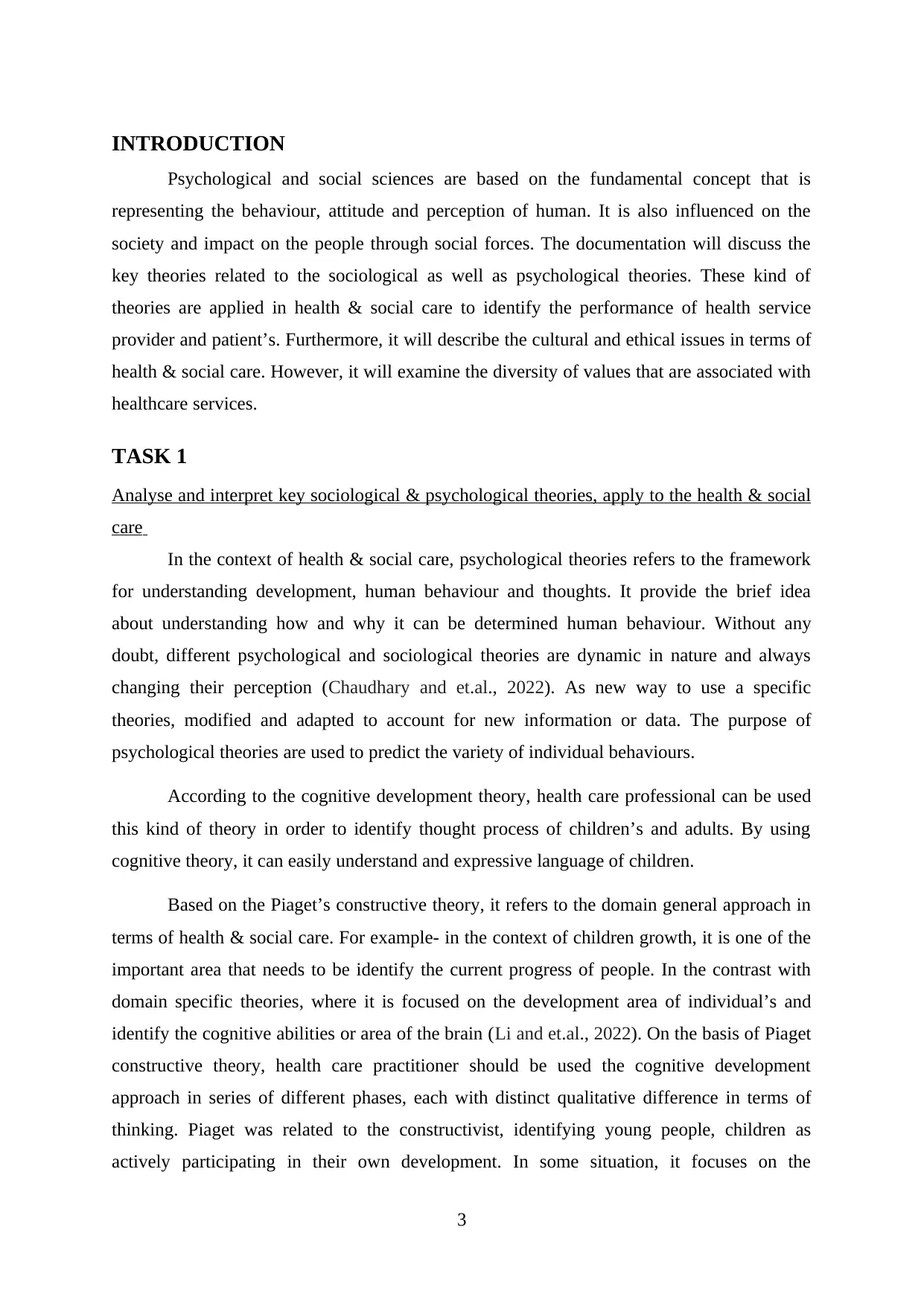
INTRODUCTION
Psychological and social sciences are based on the fundamental concept that is
representing the behaviour, attitude and perception of human. It is also influenced on the
society and impact on the people through social forces. The documentation will discuss the
key theories related to the sociological as well as psychological theories. These kind of
theories are applied in health & social care to identify the performance of health service
provider and patient’s. Furthermore, it will describe the cultural and ethical issues in terms of
health & social care. However, it will examine the diversity of values that are associated with
healthcare services.
TASK 1
Analyse and interpret key sociological & psychological theories, apply to the health & social
care
In the context of health & social care, psychological theories refers to the framework
for understanding development, human behaviour and thoughts. It provide the brief idea
about understanding how and why it can be determined human behaviour. Without any
doubt, different psychological and sociological theories are dynamic in nature and always
changing their perception (Chaudhary and et.al., 2022). As new way to use a specific
theories, modified and adapted to account for new information or data. The purpose of
psychological theories are used to predict the variety of individual behaviours.
According to the cognitive development theory, health care professional can be used
this kind of theory in order to identify thought process of children’s and adults. By using
cognitive theory, it can easily understand and expressive language of children.
Based on the Piaget’s constructive theory, it refers to the domain general approach in
terms of health & social care. For example- in the context of children growth, it is one of the
important area that needs to be identify the current progress of people. In the contrast with
domain specific theories, where it is focused on the development area of individual’s and
identify the cognitive abilities or area of the brain (Li and et.al., 2022). On the basis of Piaget
constructive theory, health care practitioner should be used the cognitive development
approach in series of different phases, each with distinct qualitative difference in terms of
thinking. Piaget was related to the constructivist, identifying young people, children as
actively participating in their own development. In some situation, it focuses on the
3
Psychological and social sciences are based on the fundamental concept that is
representing the behaviour, attitude and perception of human. It is also influenced on the
society and impact on the people through social forces. The documentation will discuss the
key theories related to the sociological as well as psychological theories. These kind of
theories are applied in health & social care to identify the performance of health service
provider and patient’s. Furthermore, it will describe the cultural and ethical issues in terms of
health & social care. However, it will examine the diversity of values that are associated with
healthcare services.
TASK 1
Analyse and interpret key sociological & psychological theories, apply to the health & social
care
In the context of health & social care, psychological theories refers to the framework
for understanding development, human behaviour and thoughts. It provide the brief idea
about understanding how and why it can be determined human behaviour. Without any
doubt, different psychological and sociological theories are dynamic in nature and always
changing their perception (Chaudhary and et.al., 2022). As new way to use a specific
theories, modified and adapted to account for new information or data. The purpose of
psychological theories are used to predict the variety of individual behaviours.
According to the cognitive development theory, health care professional can be used
this kind of theory in order to identify thought process of children’s and adults. By using
cognitive theory, it can easily understand and expressive language of children.
Based on the Piaget’s constructive theory, it refers to the domain general approach in
terms of health & social care. For example- in the context of children growth, it is one of the
important area that needs to be identify the current progress of people. In the contrast with
domain specific theories, where it is focused on the development area of individual’s and
identify the cognitive abilities or area of the brain (Li and et.al., 2022). On the basis of Piaget
constructive theory, health care practitioner should be used the cognitive development
approach in series of different phases, each with distinct qualitative difference in terms of
thinking. Piaget was related to the constructivist, identifying young people, children as
actively participating in their own development. In some situation, it focuses on the
3
⊘ This is a preview!⊘
Do you want full access?
Subscribe today to unlock all pages.

Trusted by 1+ million students worldwide
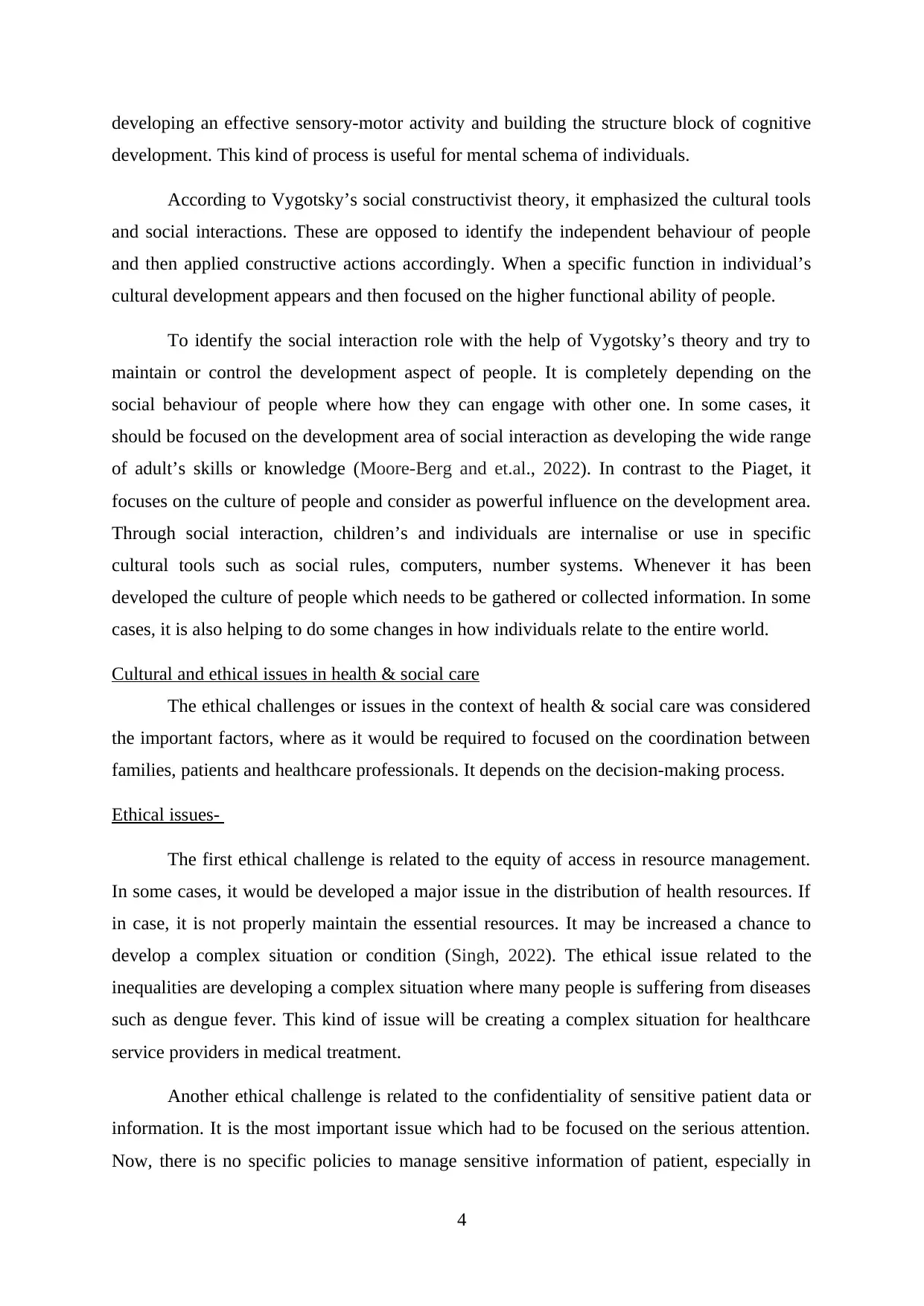
developing an effective sensory-motor activity and building the structure block of cognitive
development. This kind of process is useful for mental schema of individuals.
According to Vygotsky’s social constructivist theory, it emphasized the cultural tools
and social interactions. These are opposed to identify the independent behaviour of people
and then applied constructive actions accordingly. When a specific function in individual’s
cultural development appears and then focused on the higher functional ability of people.
To identify the social interaction role with the help of Vygotsky’s theory and try to
maintain or control the development aspect of people. It is completely depending on the
social behaviour of people where how they can engage with other one. In some cases, it
should be focused on the development area of social interaction as developing the wide range
of adult’s skills or knowledge (Moore-Berg and et.al., 2022). In contrast to the Piaget, it
focuses on the culture of people and consider as powerful influence on the development area.
Through social interaction, children’s and individuals are internalise or use in specific
cultural tools such as social rules, computers, number systems. Whenever it has been
developed the culture of people which needs to be gathered or collected information. In some
cases, it is also helping to do some changes in how individuals relate to the entire world.
Cultural and ethical issues in health & social care
The ethical challenges or issues in the context of health & social care was considered
the important factors, where as it would be required to focused on the coordination between
families, patients and healthcare professionals. It depends on the decision-making process.
Ethical issues-
The first ethical challenge is related to the equity of access in resource management.
In some cases, it would be developed a major issue in the distribution of health resources. If
in case, it is not properly maintain the essential resources. It may be increased a chance to
develop a complex situation or condition (Singh, 2022). The ethical issue related to the
inequalities are developing a complex situation where many people is suffering from diseases
such as dengue fever. This kind of issue will be creating a complex situation for healthcare
service providers in medical treatment.
Another ethical challenge is related to the confidentiality of sensitive patient data or
information. It is the most important issue which had to be focused on the serious attention.
Now, there is no specific policies to manage sensitive information of patient, especially in
4
development. This kind of process is useful for mental schema of individuals.
According to Vygotsky’s social constructivist theory, it emphasized the cultural tools
and social interactions. These are opposed to identify the independent behaviour of people
and then applied constructive actions accordingly. When a specific function in individual’s
cultural development appears and then focused on the higher functional ability of people.
To identify the social interaction role with the help of Vygotsky’s theory and try to
maintain or control the development aspect of people. It is completely depending on the
social behaviour of people where how they can engage with other one. In some cases, it
should be focused on the development area of social interaction as developing the wide range
of adult’s skills or knowledge (Moore-Berg and et.al., 2022). In contrast to the Piaget, it
focuses on the culture of people and consider as powerful influence on the development area.
Through social interaction, children’s and individuals are internalise or use in specific
cultural tools such as social rules, computers, number systems. Whenever it has been
developed the culture of people which needs to be gathered or collected information. In some
cases, it is also helping to do some changes in how individuals relate to the entire world.
Cultural and ethical issues in health & social care
The ethical challenges or issues in the context of health & social care was considered
the important factors, where as it would be required to focused on the coordination between
families, patients and healthcare professionals. It depends on the decision-making process.
Ethical issues-
The first ethical challenge is related to the equity of access in resource management.
In some cases, it would be developed a major issue in the distribution of health resources. If
in case, it is not properly maintain the essential resources. It may be increased a chance to
develop a complex situation or condition (Singh, 2022). The ethical issue related to the
inequalities are developing a complex situation where many people is suffering from diseases
such as dengue fever. This kind of issue will be creating a complex situation for healthcare
service providers in medical treatment.
Another ethical challenge is related to the confidentiality of sensitive patient data or
information. It is the most important issue which had to be focused on the serious attention.
Now, there is no specific policies to manage sensitive information of patient, especially in
4
Paraphrase This Document
Need a fresh take? Get an instant paraphrase of this document with our AI Paraphraser
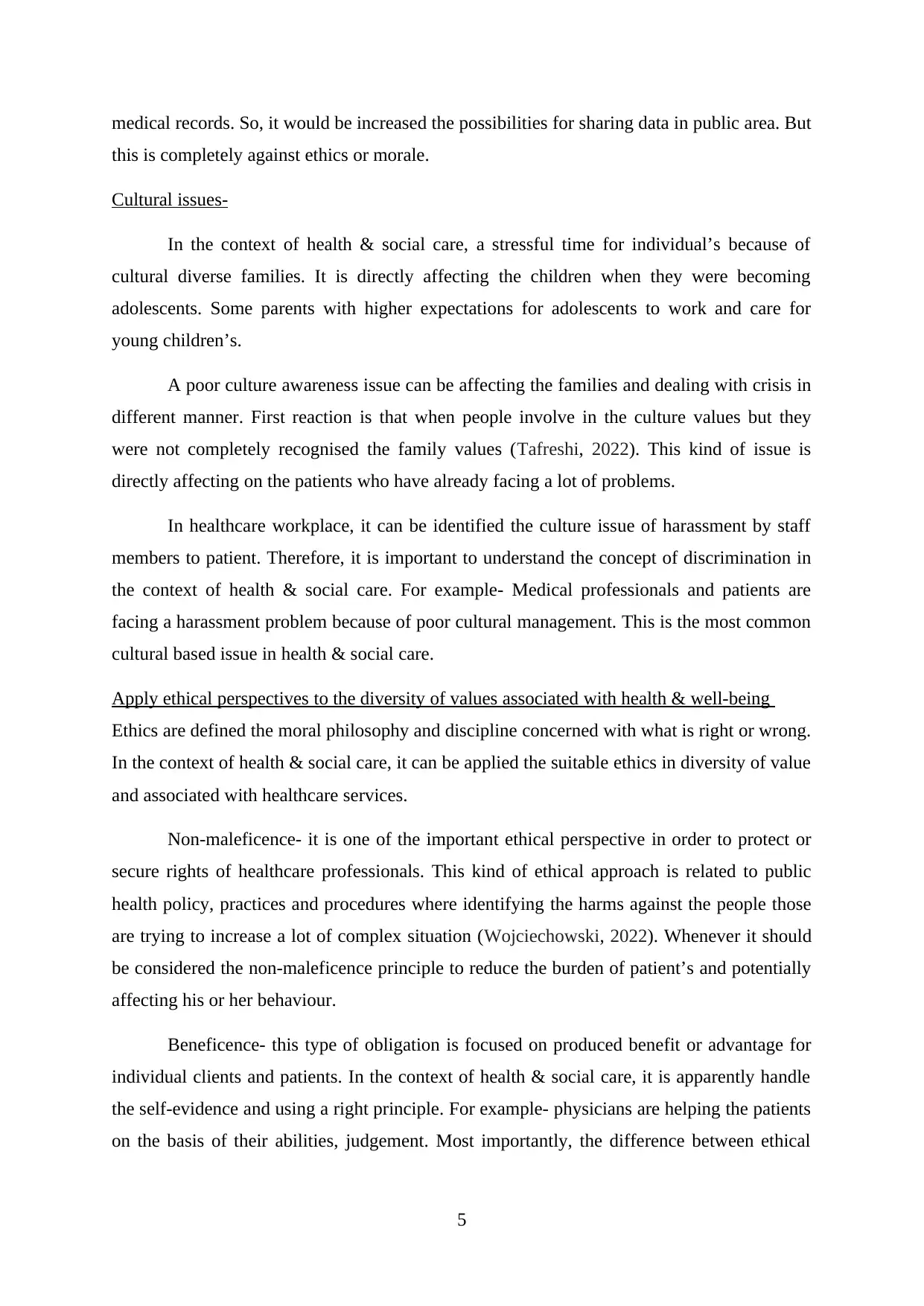
medical records. So, it would be increased the possibilities for sharing data in public area. But
this is completely against ethics or morale.
Cultural issues-
In the context of health & social care, a stressful time for individual’s because of
cultural diverse families. It is directly affecting the children when they were becoming
adolescents. Some parents with higher expectations for adolescents to work and care for
young children’s.
A poor culture awareness issue can be affecting the families and dealing with crisis in
different manner. First reaction is that when people involve in the culture values but they
were not completely recognised the family values (Tafreshi, 2022). This kind of issue is
directly affecting on the patients who have already facing a lot of problems.
In healthcare workplace, it can be identified the culture issue of harassment by staff
members to patient. Therefore, it is important to understand the concept of discrimination in
the context of health & social care. For example- Medical professionals and patients are
facing a harassment problem because of poor cultural management. This is the most common
cultural based issue in health & social care.
Apply ethical perspectives to the diversity of values associated with health & well-being
Ethics are defined the moral philosophy and discipline concerned with what is right or wrong.
In the context of health & social care, it can be applied the suitable ethics in diversity of value
and associated with healthcare services.
Non-maleficence- it is one of the important ethical perspective in order to protect or
secure rights of healthcare professionals. This kind of ethical approach is related to public
health policy, practices and procedures where identifying the harms against the people those
are trying to increase a lot of complex situation (Wojciechowski, 2022). Whenever it should
be considered the non-maleficence principle to reduce the burden of patient’s and potentially
affecting his or her behaviour.
Beneficence- this type of obligation is focused on produced benefit or advantage for
individual clients and patients. In the context of health & social care, it is apparently handle
the self-evidence and using a right principle. For example- physicians are helping the patients
on the basis of their abilities, judgement. Most importantly, the difference between ethical
5
this is completely against ethics or morale.
Cultural issues-
In the context of health & social care, a stressful time for individual’s because of
cultural diverse families. It is directly affecting the children when they were becoming
adolescents. Some parents with higher expectations for adolescents to work and care for
young children’s.
A poor culture awareness issue can be affecting the families and dealing with crisis in
different manner. First reaction is that when people involve in the culture values but they
were not completely recognised the family values (Tafreshi, 2022). This kind of issue is
directly affecting on the patients who have already facing a lot of problems.
In healthcare workplace, it can be identified the culture issue of harassment by staff
members to patient. Therefore, it is important to understand the concept of discrimination in
the context of health & social care. For example- Medical professionals and patients are
facing a harassment problem because of poor cultural management. This is the most common
cultural based issue in health & social care.
Apply ethical perspectives to the diversity of values associated with health & well-being
Ethics are defined the moral philosophy and discipline concerned with what is right or wrong.
In the context of health & social care, it can be applied the suitable ethics in diversity of value
and associated with healthcare services.
Non-maleficence- it is one of the important ethical perspective in order to protect or
secure rights of healthcare professionals. This kind of ethical approach is related to public
health policy, practices and procedures where identifying the harms against the people those
are trying to increase a lot of complex situation (Wojciechowski, 2022). Whenever it should
be considered the non-maleficence principle to reduce the burden of patient’s and potentially
affecting his or her behaviour.
Beneficence- this type of obligation is focused on produced benefit or advantage for
individual clients and patients. In the context of health & social care, it is apparently handle
the self-evidence and using a right principle. For example- physicians are helping the patients
on the basis of their abilities, judgement. Most importantly, the difference between ethical
5
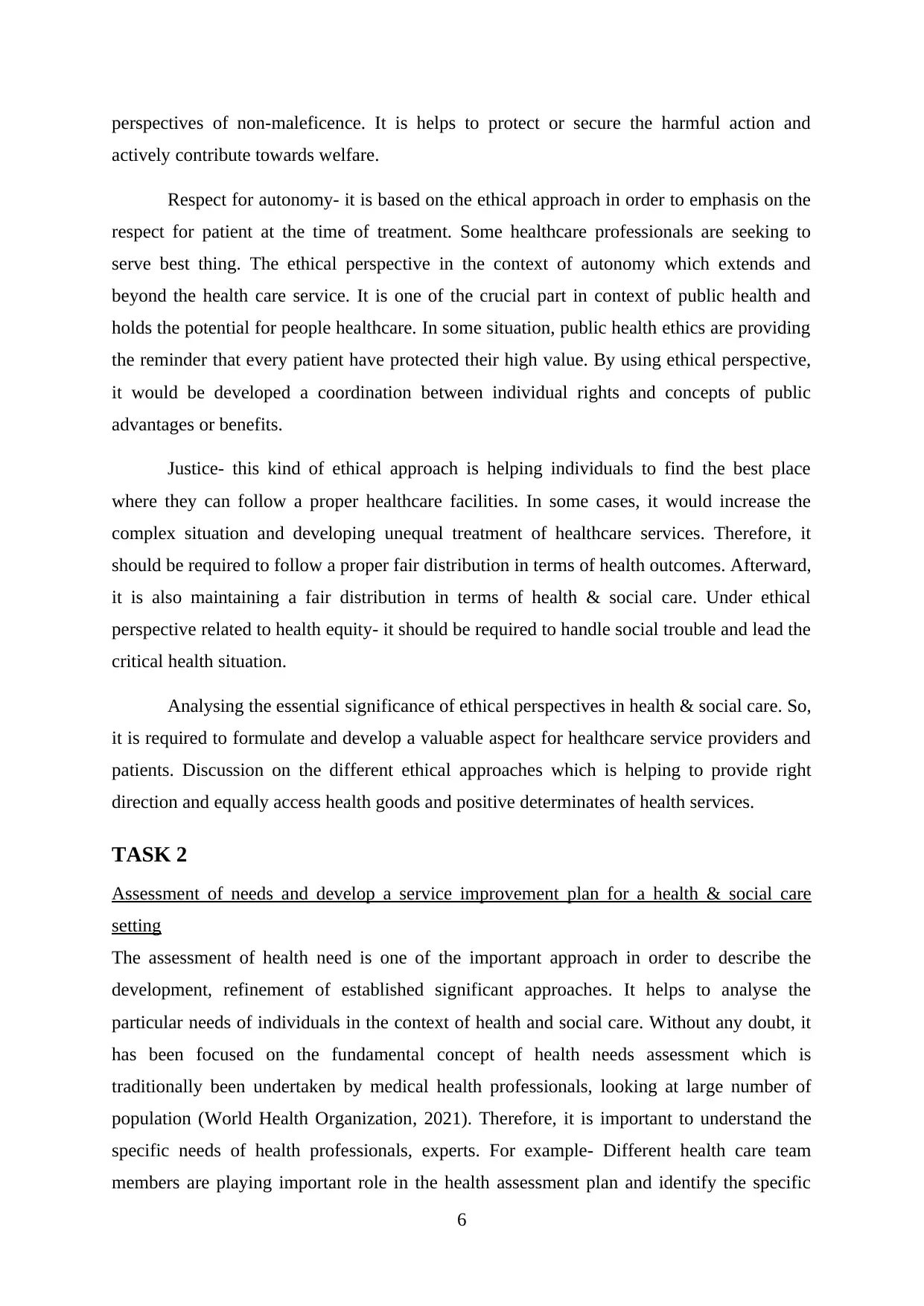
perspectives of non-maleficence. It is helps to protect or secure the harmful action and
actively contribute towards welfare.
Respect for autonomy- it is based on the ethical approach in order to emphasis on the
respect for patient at the time of treatment. Some healthcare professionals are seeking to
serve best thing. The ethical perspective in the context of autonomy which extends and
beyond the health care service. It is one of the crucial part in context of public health and
holds the potential for people healthcare. In some situation, public health ethics are providing
the reminder that every patient have protected their high value. By using ethical perspective,
it would be developed a coordination between individual rights and concepts of public
advantages or benefits.
Justice- this kind of ethical approach is helping individuals to find the best place
where they can follow a proper healthcare facilities. In some cases, it would increase the
complex situation and developing unequal treatment of healthcare services. Therefore, it
should be required to follow a proper fair distribution in terms of health outcomes. Afterward,
it is also maintaining a fair distribution in terms of health & social care. Under ethical
perspective related to health equity- it should be required to handle social trouble and lead the
critical health situation.
Analysing the essential significance of ethical perspectives in health & social care. So,
it is required to formulate and develop a valuable aspect for healthcare service providers and
patients. Discussion on the different ethical approaches which is helping to provide right
direction and equally access health goods and positive determinates of health services.
TASK 2
Assessment of needs and develop a service improvement plan for a health & social care
setting
The assessment of health need is one of the important approach in order to describe the
development, refinement of established significant approaches. It helps to analyse the
particular needs of individuals in the context of health and social care. Without any doubt, it
has been focused on the fundamental concept of health needs assessment which is
traditionally been undertaken by medical health professionals, looking at large number of
population (World Health Organization, 2021). Therefore, it is important to understand the
specific needs of health professionals, experts. For example- Different health care team
members are playing important role in the health assessment plan and identify the specific
6
actively contribute towards welfare.
Respect for autonomy- it is based on the ethical approach in order to emphasis on the
respect for patient at the time of treatment. Some healthcare professionals are seeking to
serve best thing. The ethical perspective in the context of autonomy which extends and
beyond the health care service. It is one of the crucial part in context of public health and
holds the potential for people healthcare. In some situation, public health ethics are providing
the reminder that every patient have protected their high value. By using ethical perspective,
it would be developed a coordination between individual rights and concepts of public
advantages or benefits.
Justice- this kind of ethical approach is helping individuals to find the best place
where they can follow a proper healthcare facilities. In some cases, it would increase the
complex situation and developing unequal treatment of healthcare services. Therefore, it
should be required to follow a proper fair distribution in terms of health outcomes. Afterward,
it is also maintaining a fair distribution in terms of health & social care. Under ethical
perspective related to health equity- it should be required to handle social trouble and lead the
critical health situation.
Analysing the essential significance of ethical perspectives in health & social care. So,
it is required to formulate and develop a valuable aspect for healthcare service providers and
patients. Discussion on the different ethical approaches which is helping to provide right
direction and equally access health goods and positive determinates of health services.
TASK 2
Assessment of needs and develop a service improvement plan for a health & social care
setting
The assessment of health need is one of the important approach in order to describe the
development, refinement of established significant approaches. It helps to analyse the
particular needs of individuals in the context of health and social care. Without any doubt, it
has been focused on the fundamental concept of health needs assessment which is
traditionally been undertaken by medical health professionals, looking at large number of
population (World Health Organization, 2021). Therefore, it is important to understand the
specific needs of health professionals, experts. For example- Different health care team
members are playing important role in the health assessment plan and identify the specific
6
⊘ This is a preview!⊘
Do you want full access?
Subscribe today to unlock all pages.

Trusted by 1+ million students worldwide
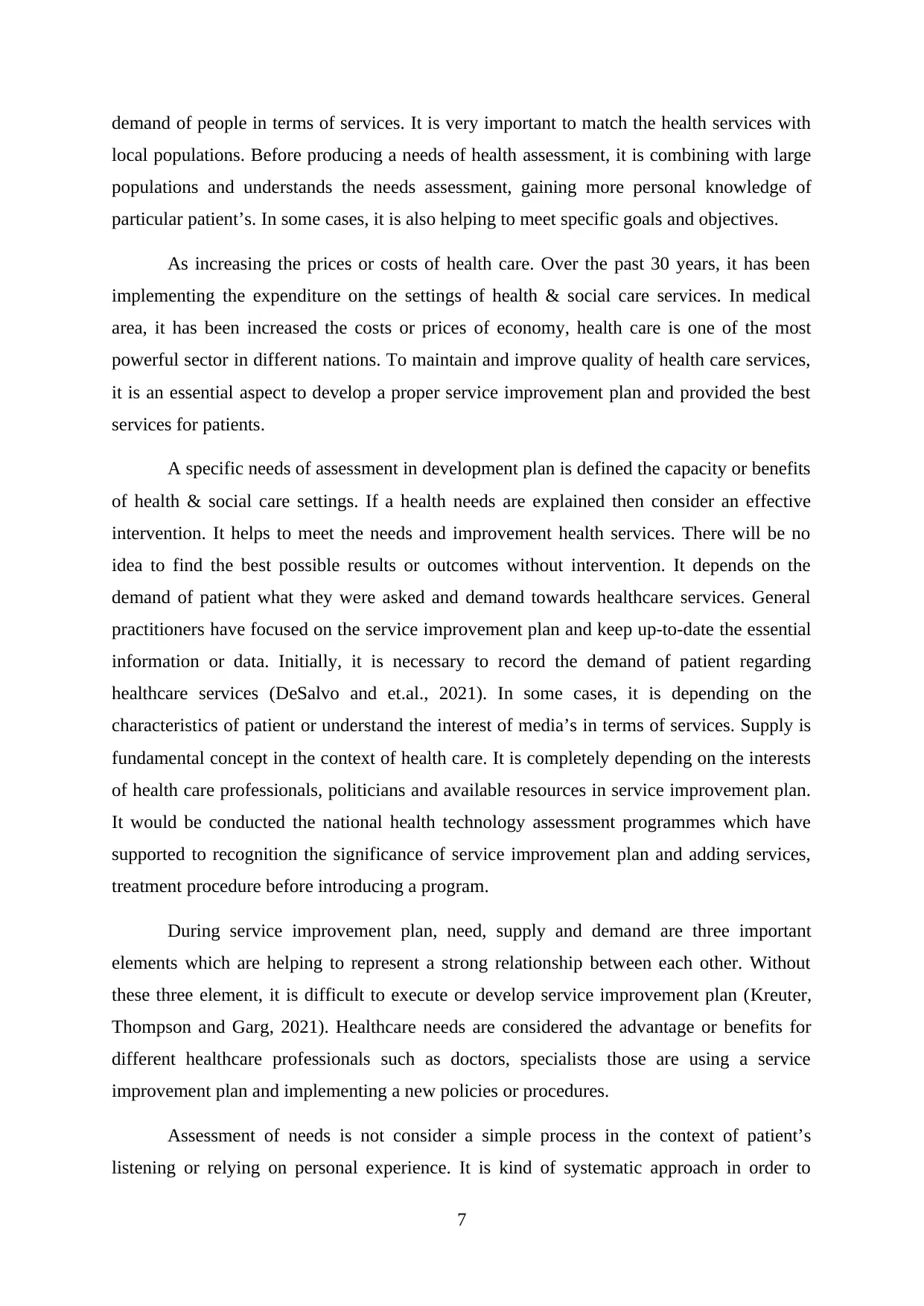
demand of people in terms of services. It is very important to match the health services with
local populations. Before producing a needs of health assessment, it is combining with large
populations and understands the needs assessment, gaining more personal knowledge of
particular patient’s. In some cases, it is also helping to meet specific goals and objectives.
As increasing the prices or costs of health care. Over the past 30 years, it has been
implementing the expenditure on the settings of health & social care services. In medical
area, it has been increased the costs or prices of economy, health care is one of the most
powerful sector in different nations. To maintain and improve quality of health care services,
it is an essential aspect to develop a proper service improvement plan and provided the best
services for patients.
A specific needs of assessment in development plan is defined the capacity or benefits
of health & social care settings. If a health needs are explained then consider an effective
intervention. It helps to meet the needs and improvement health services. There will be no
idea to find the best possible results or outcomes without intervention. It depends on the
demand of patient what they were asked and demand towards healthcare services. General
practitioners have focused on the service improvement plan and keep up-to-date the essential
information or data. Initially, it is necessary to record the demand of patient regarding
healthcare services (DeSalvo and et.al., 2021). In some cases, it is depending on the
characteristics of patient or understand the interest of media’s in terms of services. Supply is
fundamental concept in the context of health care. It is completely depending on the interests
of health care professionals, politicians and available resources in service improvement plan.
It would be conducted the national health technology assessment programmes which have
supported to recognition the significance of service improvement plan and adding services,
treatment procedure before introducing a program.
During service improvement plan, need, supply and demand are three important
elements which are helping to represent a strong relationship between each other. Without
these three element, it is difficult to execute or develop service improvement plan (Kreuter,
Thompson and Garg, 2021). Healthcare needs are considered the advantage or benefits for
different healthcare professionals such as doctors, specialists those are using a service
improvement plan and implementing a new policies or procedures.
Assessment of needs is not consider a simple process in the context of patient’s
listening or relying on personal experience. It is kind of systematic approach in order to
7
local populations. Before producing a needs of health assessment, it is combining with large
populations and understands the needs assessment, gaining more personal knowledge of
particular patient’s. In some cases, it is also helping to meet specific goals and objectives.
As increasing the prices or costs of health care. Over the past 30 years, it has been
implementing the expenditure on the settings of health & social care services. In medical
area, it has been increased the costs or prices of economy, health care is one of the most
powerful sector in different nations. To maintain and improve quality of health care services,
it is an essential aspect to develop a proper service improvement plan and provided the best
services for patients.
A specific needs of assessment in development plan is defined the capacity or benefits
of health & social care settings. If a health needs are explained then consider an effective
intervention. It helps to meet the needs and improvement health services. There will be no
idea to find the best possible results or outcomes without intervention. It depends on the
demand of patient what they were asked and demand towards healthcare services. General
practitioners have focused on the service improvement plan and keep up-to-date the essential
information or data. Initially, it is necessary to record the demand of patient regarding
healthcare services (DeSalvo and et.al., 2021). In some cases, it is depending on the
characteristics of patient or understand the interest of media’s in terms of services. Supply is
fundamental concept in the context of health care. It is completely depending on the interests
of health care professionals, politicians and available resources in service improvement plan.
It would be conducted the national health technology assessment programmes which have
supported to recognition the significance of service improvement plan and adding services,
treatment procedure before introducing a program.
During service improvement plan, need, supply and demand are three important
elements which are helping to represent a strong relationship between each other. Without
these three element, it is difficult to execute or develop service improvement plan (Kreuter,
Thompson and Garg, 2021). Healthcare needs are considered the advantage or benefits for
different healthcare professionals such as doctors, specialists those are using a service
improvement plan and implementing a new policies or procedures.
Assessment of needs is not consider a simple process in the context of patient’s
listening or relying on personal experience. It is kind of systematic approach in order to
7
Paraphrase This Document
Need a fresh take? Get an instant paraphrase of this document with our AI Paraphraser
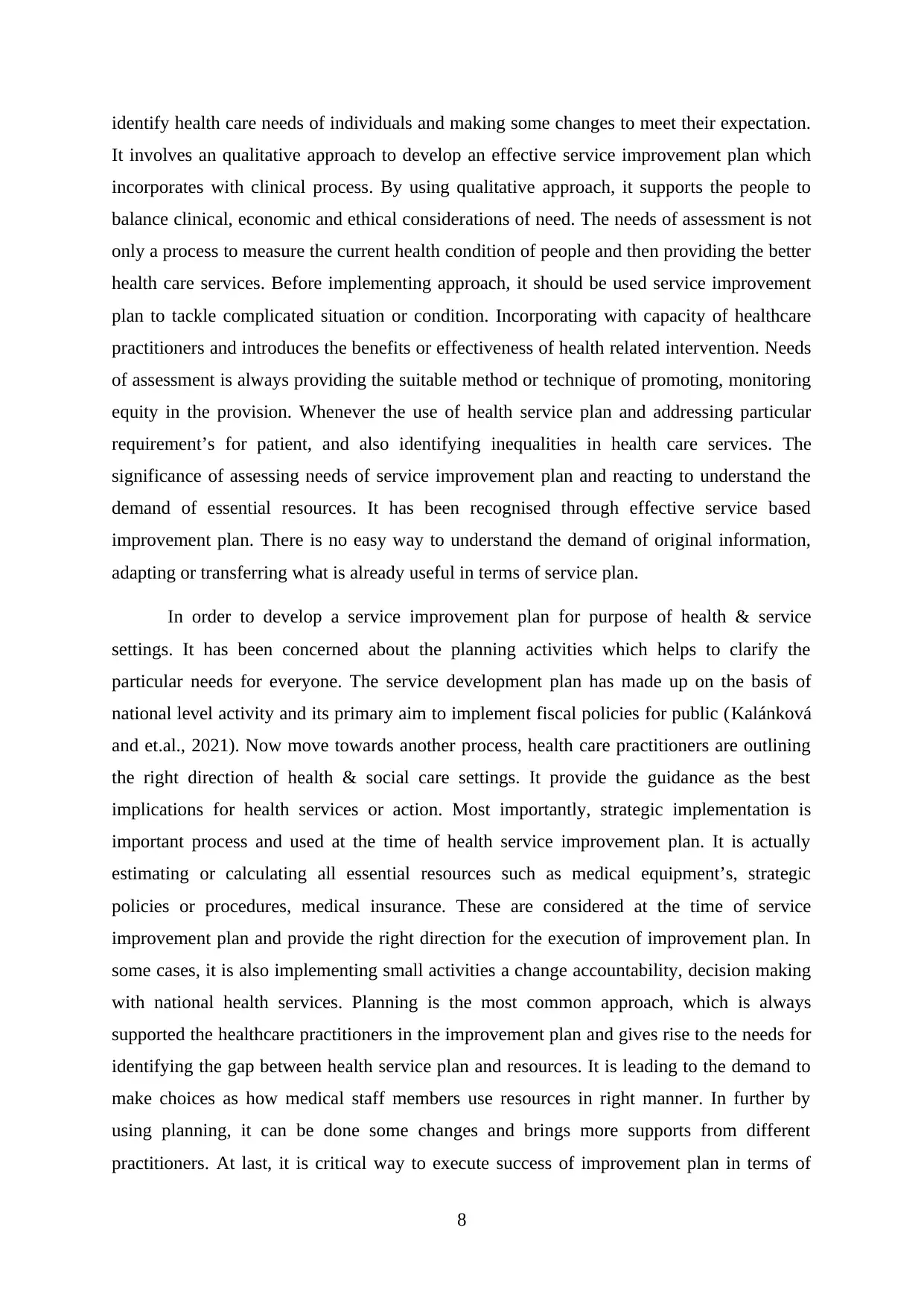
identify health care needs of individuals and making some changes to meet their expectation.
It involves an qualitative approach to develop an effective service improvement plan which
incorporates with clinical process. By using qualitative approach, it supports the people to
balance clinical, economic and ethical considerations of need. The needs of assessment is not
only a process to measure the current health condition of people and then providing the better
health care services. Before implementing approach, it should be used service improvement
plan to tackle complicated situation or condition. Incorporating with capacity of healthcare
practitioners and introduces the benefits or effectiveness of health related intervention. Needs
of assessment is always providing the suitable method or technique of promoting, monitoring
equity in the provision. Whenever the use of health service plan and addressing particular
requirement’s for patient, and also identifying inequalities in health care services. The
significance of assessing needs of service improvement plan and reacting to understand the
demand of essential resources. It has been recognised through effective service based
improvement plan. There is no easy way to understand the demand of original information,
adapting or transferring what is already useful in terms of service plan.
In order to develop a service improvement plan for purpose of health & service
settings. It has been concerned about the planning activities which helps to clarify the
particular needs for everyone. The service development plan has made up on the basis of
national level activity and its primary aim to implement fiscal policies for public (Kalánková
and et.al., 2021). Now move towards another process, health care practitioners are outlining
the right direction of health & social care settings. It provide the guidance as the best
implications for health services or action. Most importantly, strategic implementation is
important process and used at the time of health service improvement plan. It is actually
estimating or calculating all essential resources such as medical equipment’s, strategic
policies or procedures, medical insurance. These are considered at the time of service
improvement plan and provide the right direction for the execution of improvement plan. In
some cases, it is also implementing small activities a change accountability, decision making
with national health services. Planning is the most common approach, which is always
supported the healthcare practitioners in the improvement plan and gives rise to the needs for
identifying the gap between health service plan and resources. It is leading to the demand to
make choices as how medical staff members use resources in right manner. In further by
using planning, it can be done some changes and brings more supports from different
practitioners. At last, it is critical way to execute success of improvement plan in terms of
8
It involves an qualitative approach to develop an effective service improvement plan which
incorporates with clinical process. By using qualitative approach, it supports the people to
balance clinical, economic and ethical considerations of need. The needs of assessment is not
only a process to measure the current health condition of people and then providing the better
health care services. Before implementing approach, it should be used service improvement
plan to tackle complicated situation or condition. Incorporating with capacity of healthcare
practitioners and introduces the benefits or effectiveness of health related intervention. Needs
of assessment is always providing the suitable method or technique of promoting, monitoring
equity in the provision. Whenever the use of health service plan and addressing particular
requirement’s for patient, and also identifying inequalities in health care services. The
significance of assessing needs of service improvement plan and reacting to understand the
demand of essential resources. It has been recognised through effective service based
improvement plan. There is no easy way to understand the demand of original information,
adapting or transferring what is already useful in terms of service plan.
In order to develop a service improvement plan for purpose of health & service
settings. It has been concerned about the planning activities which helps to clarify the
particular needs for everyone. The service development plan has made up on the basis of
national level activity and its primary aim to implement fiscal policies for public (Kalánková
and et.al., 2021). Now move towards another process, health care practitioners are outlining
the right direction of health & social care settings. It provide the guidance as the best
implications for health services or action. Most importantly, strategic implementation is
important process and used at the time of health service improvement plan. It is actually
estimating or calculating all essential resources such as medical equipment’s, strategic
policies or procedures, medical insurance. These are considered at the time of service
improvement plan and provide the right direction for the execution of improvement plan. In
some cases, it is also implementing small activities a change accountability, decision making
with national health services. Planning is the most common approach, which is always
supported the healthcare practitioners in the improvement plan and gives rise to the needs for
identifying the gap between health service plan and resources. It is leading to the demand to
make choices as how medical staff members use resources in right manner. In further by
using planning, it can be done some changes and brings more supports from different
practitioners. At last, it is critical way to execute success of improvement plan in terms of
8
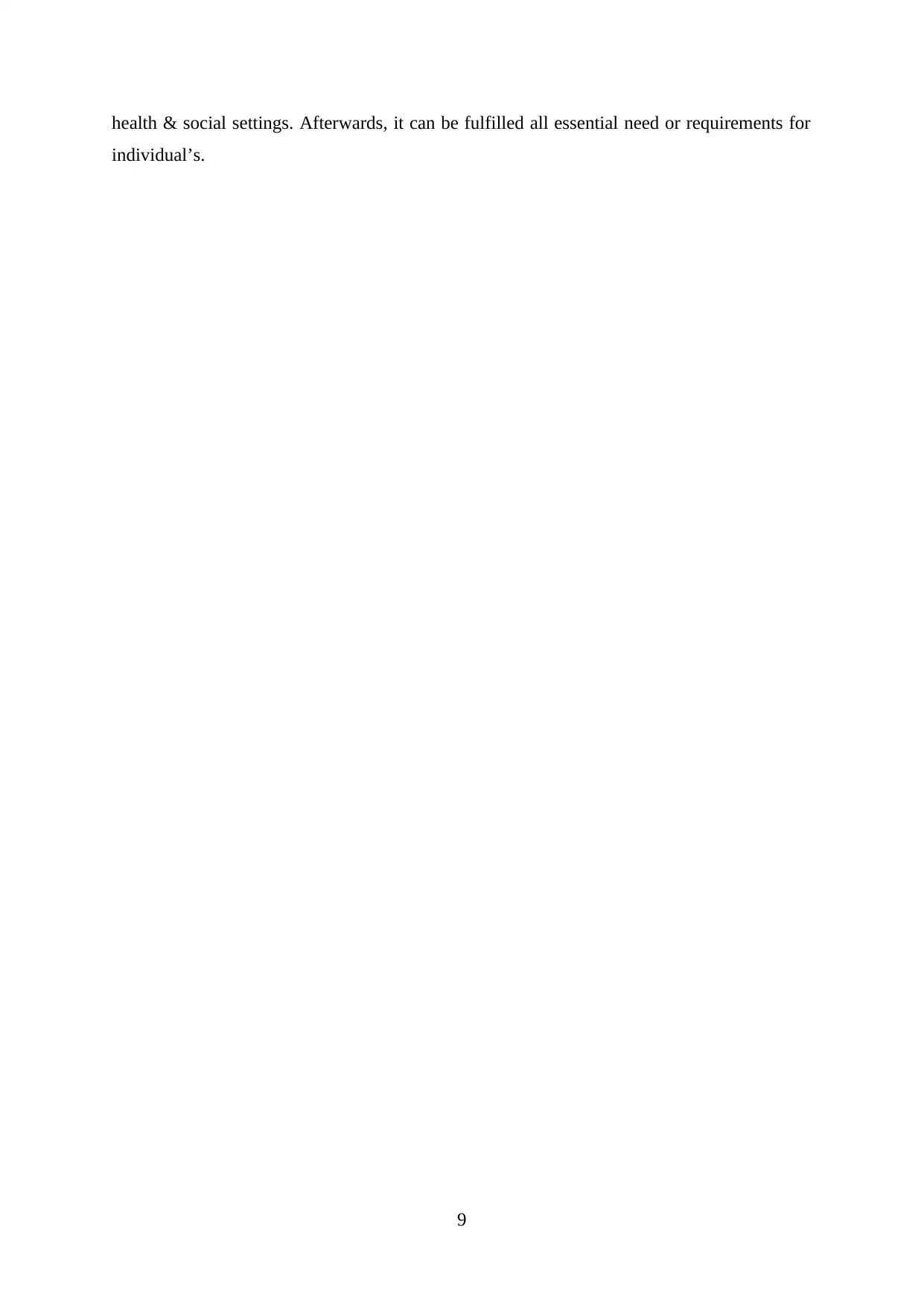
health & social settings. Afterwards, it can be fulfilled all essential need or requirements for
individual’s.
9
individual’s.
9
⊘ This is a preview!⊘
Do you want full access?
Subscribe today to unlock all pages.

Trusted by 1+ million students worldwide
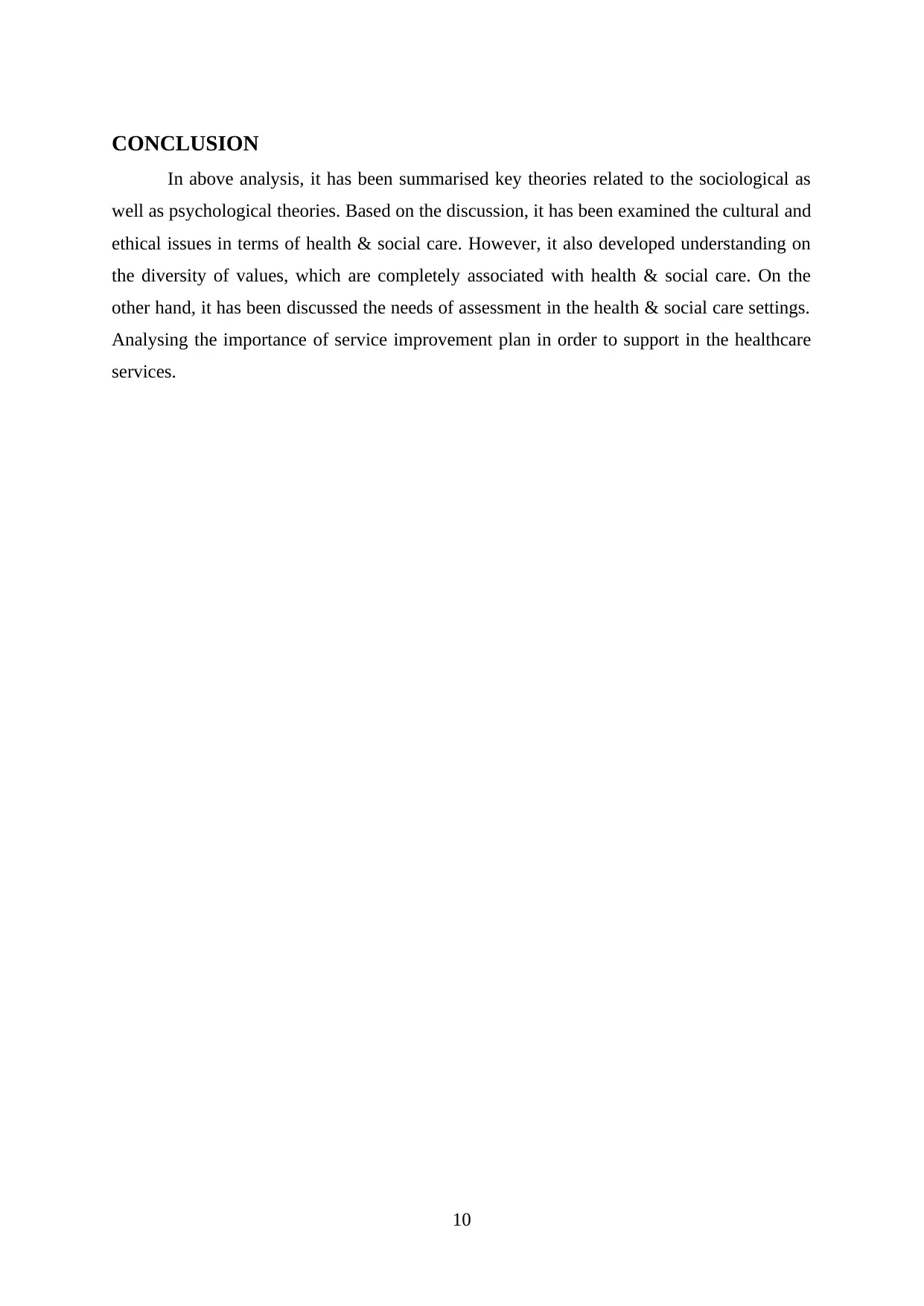
CONCLUSION
In above analysis, it has been summarised key theories related to the sociological as
well as psychological theories. Based on the discussion, it has been examined the cultural and
ethical issues in terms of health & social care. However, it also developed understanding on
the diversity of values, which are completely associated with health & social care. On the
other hand, it has been discussed the needs of assessment in the health & social care settings.
Analysing the importance of service improvement plan in order to support in the healthcare
services.
10
In above analysis, it has been summarised key theories related to the sociological as
well as psychological theories. Based on the discussion, it has been examined the cultural and
ethical issues in terms of health & social care. However, it also developed understanding on
the diversity of values, which are completely associated with health & social care. On the
other hand, it has been discussed the needs of assessment in the health & social care settings.
Analysing the importance of service improvement plan in order to support in the healthcare
services.
10
Paraphrase This Document
Need a fresh take? Get an instant paraphrase of this document with our AI Paraphraser
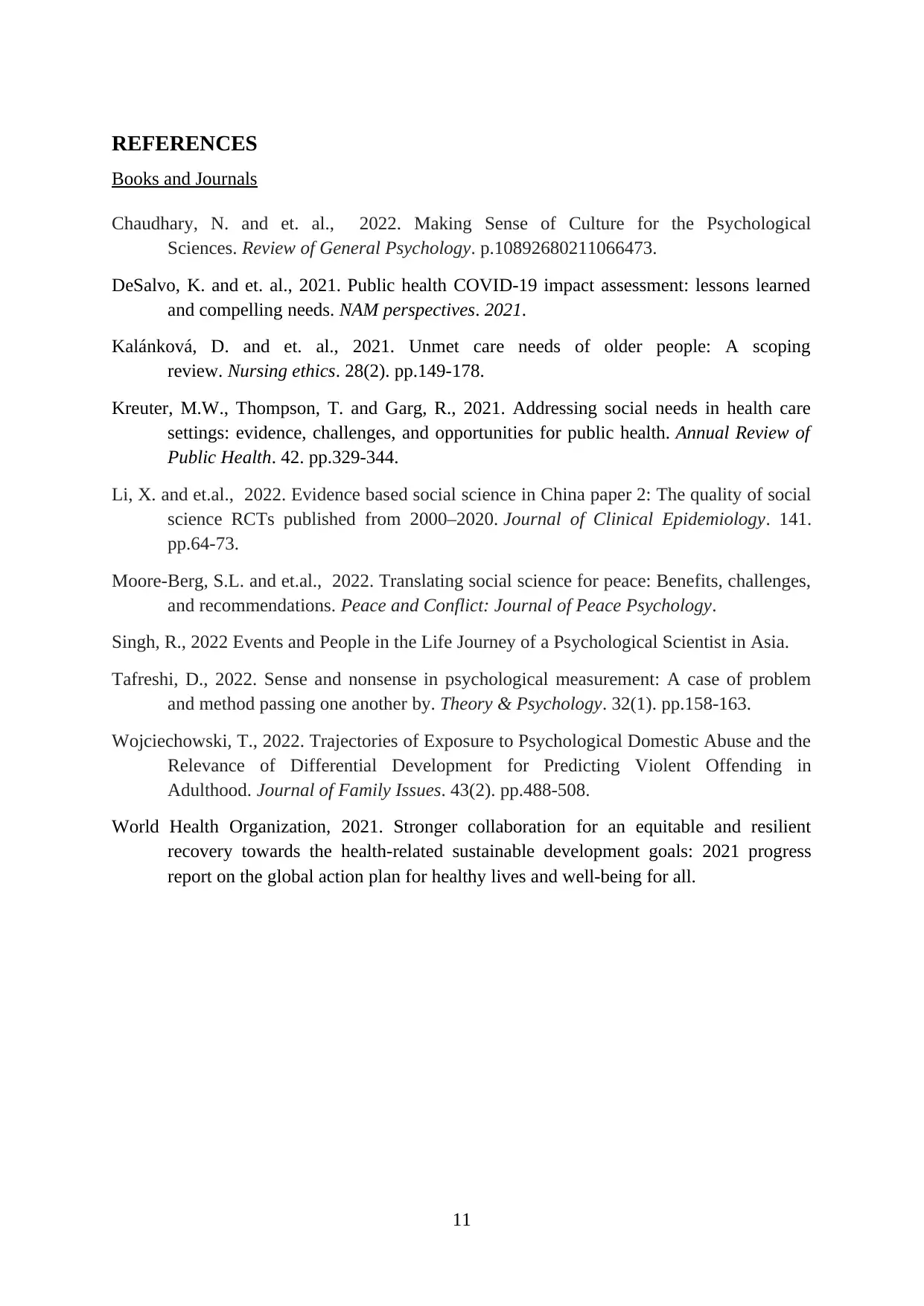
REFERENCES
Books and Journals
Chaudhary, N. and et. al., 2022. Making Sense of Culture for the Psychological
Sciences. Review of General Psychology. p.10892680211066473.
DeSalvo, K. and et. al., 2021. Public health COVID-19 impact assessment: lessons learned
and compelling needs. NAM perspectives. 2021.
Kalánková, D. and et. al., 2021. Unmet care needs of older people: A scoping
review. Nursing ethics. 28(2). pp.149-178.
Kreuter, M.W., Thompson, T. and Garg, R., 2021. Addressing social needs in health care
settings: evidence, challenges, and opportunities for public health. Annual Review of
Public Health. 42. pp.329-344.
Li, X. and et.al., 2022. Evidence based social science in China paper 2: The quality of social
science RCTs published from 2000–2020. Journal of Clinical Epidemiology. 141.
pp.64-73.
Moore-Berg, S.L. and et.al., 2022. Translating social science for peace: Benefits, challenges,
and recommendations. Peace and Conflict: Journal of Peace Psychology.
Singh, R., 2022 Events and People in the Life Journey of a Psychological Scientist in Asia.
Tafreshi, D., 2022. Sense and nonsense in psychological measurement: A case of problem
and method passing one another by. Theory & Psychology. 32(1). pp.158-163.
Wojciechowski, T., 2022. Trajectories of Exposure to Psychological Domestic Abuse and the
Relevance of Differential Development for Predicting Violent Offending in
Adulthood. Journal of Family Issues. 43(2). pp.488-508.
World Health Organization, 2021. Stronger collaboration for an equitable and resilient
recovery towards the health-related sustainable development goals: 2021 progress
report on the global action plan for healthy lives and well-being for all.
11
Books and Journals
Chaudhary, N. and et. al., 2022. Making Sense of Culture for the Psychological
Sciences. Review of General Psychology. p.10892680211066473.
DeSalvo, K. and et. al., 2021. Public health COVID-19 impact assessment: lessons learned
and compelling needs. NAM perspectives. 2021.
Kalánková, D. and et. al., 2021. Unmet care needs of older people: A scoping
review. Nursing ethics. 28(2). pp.149-178.
Kreuter, M.W., Thompson, T. and Garg, R., 2021. Addressing social needs in health care
settings: evidence, challenges, and opportunities for public health. Annual Review of
Public Health. 42. pp.329-344.
Li, X. and et.al., 2022. Evidence based social science in China paper 2: The quality of social
science RCTs published from 2000–2020. Journal of Clinical Epidemiology. 141.
pp.64-73.
Moore-Berg, S.L. and et.al., 2022. Translating social science for peace: Benefits, challenges,
and recommendations. Peace and Conflict: Journal of Peace Psychology.
Singh, R., 2022 Events and People in the Life Journey of a Psychological Scientist in Asia.
Tafreshi, D., 2022. Sense and nonsense in psychological measurement: A case of problem
and method passing one another by. Theory & Psychology. 32(1). pp.158-163.
Wojciechowski, T., 2022. Trajectories of Exposure to Psychological Domestic Abuse and the
Relevance of Differential Development for Predicting Violent Offending in
Adulthood. Journal of Family Issues. 43(2). pp.488-508.
World Health Organization, 2021. Stronger collaboration for an equitable and resilient
recovery towards the health-related sustainable development goals: 2021 progress
report on the global action plan for healthy lives and well-being for all.
11
1 out of 11
Related Documents
Your All-in-One AI-Powered Toolkit for Academic Success.
+13062052269
info@desklib.com
Available 24*7 on WhatsApp / Email
![[object Object]](/_next/static/media/star-bottom.7253800d.svg)
Unlock your academic potential
Copyright © 2020–2026 A2Z Services. All Rights Reserved. Developed and managed by ZUCOL.




